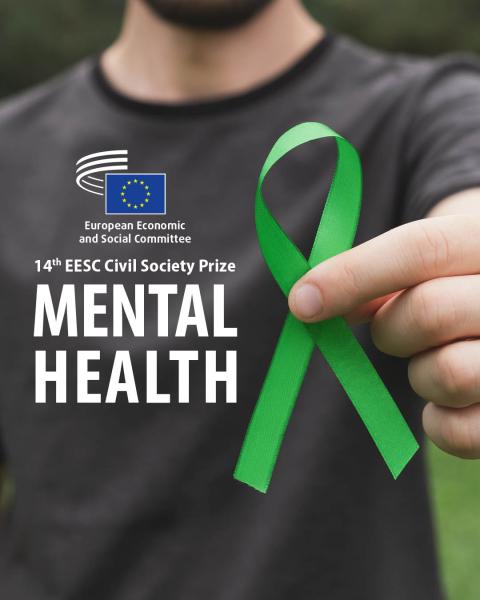European Economic
and Social Committee
EESC announces five nominees for its Civil Society Prize on mental health
The European Economic and Social Committee (EESC) is giving its flagship Civil Society Prize to non-profit projects supporting the mental well-being of Europeans
Two non-profit projects from Finland and one each from Ireland, Italy and Slovakia are among the contenders for the EESC’s 14th Civil Society Prize, which is dedicated to mental health. The EESC will reveal the final ranking of the winners on 7 March at the award ceremony held during its inaugural Civil Society Week, which will take place in Brussels in early March.
The total prize money of EUR 50 000 will be shared among the five front-runners. The winner of the first prize will take home EUR 14 000 and the other four finalists will each receive EUR 9 000.
The winners were chosen from over 100 applications from 23 Member States. The creativity and dedication of the submitted projects showcase civil society’s tremendous enthusiasm and strong motivation to help people battling with mental health issues, and demonstrate their vital contribution to curbing the explosion of this silent epidemic in the EU.
The five winning projects (listed below in alphabetical order) are:
- AgeWell, a project by the Third Age Foundation, IRELAND
AgeWell
is a social engagement network that improves well-being among older people who are isolated, frail and vulnerable. Using a combination of in-house visits and a smartphone application, it offers companionship and emotional support to those who lack them and identifies health risks at an early stage. Monitoring the elderly in need are older volunteers, who in this way enrich their own lives as well as those of others. AgeWell is run by the Third Age Foundation, a charity based in Ireland.
- The ‘Crazy? So what!’ initiative run by Integra, SLOVAKIA
The initiative Crazy? So what!
by Slovak organisation Integra breaks down stereotypes by promoting a compassionate understanding of mental health among young people and by providing first-hand insight into what it is like to have poor mental health and into the road to recovery. A professional expert and an adult with personal experience of mental illness visit schools for a day to talk to students aged between 15 and 20. The programme has been positively received by students, encouraging them to talk openly about their mental health and offering hope for the future.
- Lapinlahden Lähde — a community centre run by the Pro Lapinlahti association, FINLAND
Lapinlahden Lähde,
or The Spring of Lapinlahti
is a community centre which offers everyone, and especially people with mental health difficulties, a nurturing and inclusive environment to heal and enjoy nature and culture. Declared a diagnosis-free zone, it allows everyone to be who they are without being labelled, offering empowerment instead of paternalism. Built through the renovation of Helsinki’s Lapinlahti Hospital, and run by the non-profit Pro Lapinlahti association, the centre organises various workshops and events related to mental health literacy. It boasts 50 000 visitors each year.
- Telling Stories for Good — a project by the Animenta organisation, ITALY
With the project Telling Stories for Good
, Italian non-profit organisation Animenta is rewriting stereotypical narratives on eating disorders, which affect more than four million people in Italy alone, two million of whom are adolescents. Its prevention and awareness-raising programmes are carried out by volunteer professionals online and in schools across Italy and have so far reached 10 000 children. It also provides specific help to those suffering from eating disorders and their families. Virtual online dinners, created with the help of a volunteer dietitian, also encourage young people to approach meals in a healthy way again.
- The World of Recovery — games created by the Lilinkoti Foundation, FINLAND
The World of Recovery
consists of two games designed to support mental health. Set in a futuristic world of hope, they promote a player’s journey to recovery through goals that inspire a healthy self-image, personal autonomy, and an active and meaningful life. The first is a non-violent mobile game and the second is an award-winning table-top role-playing game. Created by the Lilinkoti Foundation, the games target mental health and substance abuse recoverers, along with professionals, and are free to use.
Commenting on the prize, the EESC Vice-President for Communication, Aurel Laurențiu Plosceanu, said: A sense of “collective malaise” was evident in many of the applications we received, pointing to a link between the recent multiple crises – a cruel war in our neighbourhood, the pandemic, inflation, natural disasters – and mental health. Our candidates have been dealing with many different situations and using many different tools to provide help to people battling with mental health issues. They prove that civil society provides services that are currently not adequately supplied by public health systems, and addresses the special needs of vulnerable groups. Thanks to its close connection with local communities, civil society provides frontline assistance in both a formal and informal way and also provides services to hard-to-reach populations.
The EESC launched the prize in July 2023 and dedicated it to mental health, wanting to recognise the crucial role played by civil society in mental health treatment and prevention.
The prize, awarded for the 14th time, honours non-profit projects carried out by individuals, civil society organisations and companies. A different theme is chosen each year, covering an important area of the EESC’s work. The prize money and the recognition they receive should help the winners to scale up their projects and provide further help in their communities.
In 2022 the EESC exceptionally granted prizes for two themes: youth and help for Ukraine. In 2021, the prize rewarded climate projects promoting a just transition. In 2020, the EESC replaced its Civil Society Prize with a one-off Civil Solidarity Prize dedicated to the fight against COVID-19. Other topics in the past have included gender equality and women’s empowerment, European identities and cultural heritage, and migration.
